iPod, iPad, iPhone (87G) and iGov’t
July 31, 2011 by admin
Filed under Blog, Just For Laughs
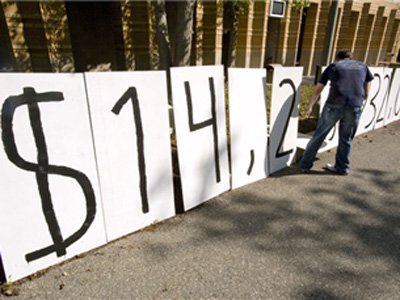 I haven’t made any comments about our government and the debt crisis yet because I believe there are plenty of people who know the right answer and none of them work or are associated with anything that happens in or around Washington. The entire situation is beyond frustrating to the American people, especially to those of us who are hard-working, smart-spending, family-oriented, small-government-oriented, red-white-and-blue-proud, military-supporting, separation-of-church-and-state-doesn’t-mean-what-everyone-thinks-it-means, kinda people!!!
I haven’t made any comments about our government and the debt crisis yet because I believe there are plenty of people who know the right answer and none of them work or are associated with anything that happens in or around Washington. The entire situation is beyond frustrating to the American people, especially to those of us who are hard-working, smart-spending, family-oriented, small-government-oriented, red-white-and-blue-proud, military-supporting, separation-of-church-and-state-doesn’t-mean-what-everyone-thinks-it-means, kinda people!!!
 But get this… I check Facebook today and see lots of people posting about how Apple has more cash on hand than our government! How crazy is this?!?! I mean seriously! These people sell gadgets… the government is supposed to be in charge of everything! Gadgets versus government and gadgets is winning?! I’m actually not as surprised as you might think. And honestly, I think the whole thing is laughable.
But get this… I check Facebook today and see lots of people posting about how Apple has more cash on hand than our government! How crazy is this?!?! I mean seriously! These people sell gadgets… the government is supposed to be in charge of everything! Gadgets versus government and gadgets is winning?! I’m actually not as surprised as you might think. And honestly, I think the whole thing is laughable.
I don’t own any Apple products. I’m completely fine with that. (Did you like my iPhone 87G joke in the title?) The last time I used an Apple computer for any 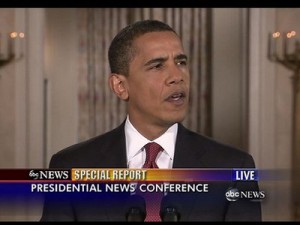 length of time was playing Oregon Trail on one when I was a kid in grade school. I can’t stand them, mostly because I don’t know how to use them. I’ve tinkered around with a few Apple products before, but I just don’t get the hype. Apparently, I am the only one because they’ve got more money than the US government, which means that most of you reading this probably own all sorts of products from this booming company. Mr. Obama… maybe you should step down and let Mr. Jobs do yours for you.
length of time was playing Oregon Trail on one when I was a kid in grade school. I can’t stand them, mostly because I don’t know how to use them. I’ve tinkered around with a few Apple products before, but I just don’t get the hype. Apparently, I am the only one because they’ve got more money than the US government, which means that most of you reading this probably own all sorts of products from this booming company. Mr. Obama… maybe you should step down and let Mr. Jobs do yours for you.
TrueMan up!
Mentoring Boys into Virtuous Catholic Men
July 28, 2011 by admin
Filed under Blog, Faith, Fatherhood, manliness, Scriptural Examples, Sports, Virtue
We concentrate our energy on forming and building men. At Fraternus, a great Catholic apostolate,  they concentrate on forming boys into men. “Mentoring boys into virtuous Catholic men.” That’s what they’re all about.
they concentrate on forming boys into men. “Mentoring boys into virtuous Catholic men.” That’s what they’re all about.
What’s happening in these boys’ lives is transforming, and will make an impact on them for years to come. For boys, you have to engage them with the things that speak to their inner being – the things that make them wild, rough, adventurous and challenged. This is the way Christ lived, that’s why it’s so appealing to boys. It’s real, it’s authentically masculine and it’s really fun.
When you can reach a boy, you can teach him and form him. When a boy is taught and formed properly, he becomes a great man. Our world needs a lot of great men.
Please take a few moments to watch their video and visit their website.
TrueMan up!
The Catholic Church is Booming
 I know the reality of reports and surveys and statistical data – you can make them say what you want to. We see skewed results all the time. There are, however, some statistics worth looking at. For instance, statistics like the information below, is encouraging and should give us (faithful Catholics) hope. I like this information because it doesn’t come from a particularly orthodox source. We (Catholics) are often the butt of jokes, the slander of the day and ridiculed and persecuted for our conservative (truthful) beliefs. The last allowable form of prejudice in our land – anti-Catholicism. Maybe as we continue to flourish and continue to seek truth, we will band together and put an end to the ludicrous culture of death.
I know the reality of reports and surveys and statistical data – you can make them say what you want to. We see skewed results all the time. There are, however, some statistics worth looking at. For instance, statistics like the information below, is encouraging and should give us (faithful Catholics) hope. I like this information because it doesn’t come from a particularly orthodox source. We (Catholics) are often the butt of jokes, the slander of the day and ridiculed and persecuted for our conservative (truthful) beliefs. The last allowable form of prejudice in our land – anti-Catholicism. Maybe as we continue to flourish and continue to seek truth, we will band together and put an end to the ludicrous culture of death.
From Al Kresta earlier today:
“Catholic League president Bill Donohue comments on new survey data profiling Catholicism:
All we ever hear from the wild-eyed critics of the Catholic Church, including the dissidents within, is that the Church had better “get with it” and change its teachings on abortion, homosexuality and women’s ordination. Yet it is precisely those religious institutions that are the most liberal on these issues—the mainline Protestant denominations—that are collapsing. Not so the Catholic Church. Indeed, its numbers are going north while the mainline denominations are going south.
with it” and change its teachings on abortion, homosexuality and women’s ordination. Yet it is precisely those religious institutions that are the most liberal on these issues—the mainline Protestant denominations—that are collapsing. Not so the Catholic Church. Indeed, its numbers are going north while the mainline denominations are going south.
The latest findings by the “Emerging Models of Pastoral Leadership” project, a collaborative effort with Georgetown University’s Center for Applied Research in the Apostolate, are illuminating. In the last 40 years, the Catholic population has increased by 75 percent; it has grown by 50 percent since 1990. More important, Catholic attendance at Mass is up 15 percent since 2000. And in the last five years, contributions have increased by 14 percent. It is also important to note that there has been a 40 percent increase in Latinos in the Church over the past five years.
Shedding more light on the statistics is a study released a few months ago by the Pew Research Center’s Forum on Religion. Its “Landscape Survey” found that of those Catholics who have left the Church, roughly half became unaffiliated while the other half became Protestant. Regarding the latter half, only 23 percent did so because of the Church’s teachings on abortion and homosexuality; only 16 percent left because of the way women are treated. Importantly, two-thirds of these Catholics elected to join a Protestant evangelical church.
In other words, disaffected Catholics who left for another religion opted to join a more conservative church. That they did not run down the block in search of a mainline denomination—one that entertains the liberal agenda on issues governing sexuality and women—is telling.
It’s time some people took a hard look at the data and made some hard choices. This is great news for the Catholic Church.”
“Skirt Covering the Knees, Leg Warmers, Boots, a Half-Sleeved Shirt…”
July 23, 2011 by admin
Filed under Blog, cultural manliness, Faith, manliness, pornography
These are words that have never come out of my mouth as to something I was wearing. Other than the boots part. Skirt? Leg Warmers? Geez. I thought this story was a joke when I first saw it about two weeks ago, but apparently, it’s not. This guy actually exists. I looked up his “art”… very disturbing. I don’t recommend it. In fact, I suggest you don’t. It’s a bit pornographic and very sacrilegious. There are very clear and problematic issues with this male’s stance… it is the same problem that we see often in our culture; the oxymoron of feminine-men and masculine-women. Put plainly, when men and women lose their gender roles and responsibilities, there is a disorder happening and things get all out of whack. As I’ve written several times before, our Church and many of Her leaders (including Blessed John Paul II) emphatically teach “equal in dignity, difference in roles.” It’s the only thing that makes sense.
I’m glad the Vatican stands up to this sort of behavior. If an institution in America did this, they’d be sued, all over the lib-media and denounced as intolerant and judgmental. The Vatican plays by different rules. Thank goodness. Here’s the story…
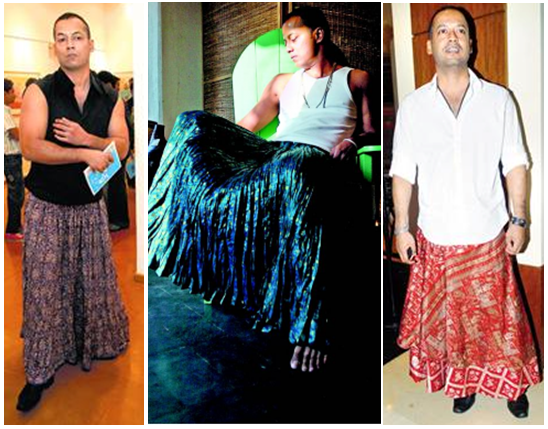 “Mumbai-based artist Julius Macwan has felt strongly about women’s causes for a long time — in solidarity of which he wears skirts, a statement that he feels underlines his connection with and sympathies for the fairer sex. But this very ‘rule breaking’ got him into a bit of a conundrum in Rome last week.
“Mumbai-based artist Julius Macwan has felt strongly about women’s causes for a long time — in solidarity of which he wears skirts, a statement that he feels underlines his connection with and sympathies for the fairer sex. But this very ‘rule breaking’ got him into a bit of a conundrum in Rome last week.
Julius, a Roman Catholic by birth, inspired by Italy’s greats Michelangelo and Bernini in his art, named after Roman emperor Julius Caesar was ironically stopped at the very gates he was longing to pass through for a very long time — he was forbidden from entering the Vatican because he was in a skirt.
“I was in a state of shock, my mind was numb,” Macwan, now back in Mumbai, recalled. “My most famous work is inspired by the Pieta, it is also called the Pieta/The Death of Magic. I wanted to see the Pieta in the Vatican, had dressed formally for the occasion — skirt covering the knees, leg warmers, boots, a half- sleeved shirt. You can say my outfit was inspired by Roman warriors of the past.”
It might be interesting to note that Macwan’s Pieta/The Death of Magic depicts a self portrait of Julius himself, in a skirt, holding the body of a woman in a bikini, representative of the magic of womanhood dying in a male-controlled world. Macwan’s Pieta is now part of Harsh Goenka’s collection.
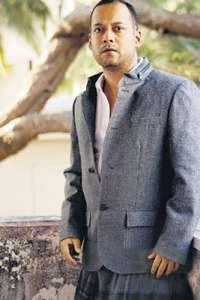 The original Pieta, (which has four versions, the most famed being in the Vatican) sculpted by Italian genius Michelangelo depicts the Virgin Mary distraught as she holds the body of Christ.
The original Pieta, (which has four versions, the most famed being in the Vatican) sculpted by Italian genius Michelangelo depicts the Virgin Mary distraught as she holds the body of Christ.
Despite his knees being covered, Macwan was stopped at the gates and asked if he were Scottish (because his attire resembled the kilt).
“I didn’t know till I reached the Vatican that the dress code requires shoulders and knees to be covered. Mine were covered, though I was in a skirt, but when I said I wasn’t Scottish, the person at the gate wouldn’t let me through,” he said. The person seemed to be a priest – he was in a white buttoned smock. “I was thrilled to be at the Vatican, I’m Roman Catholic, named after the Roman Caesar, I was in his city, my work deals with the Pieta, I was wearing Roman-inspired clothing, thinking in this visit, destiny completes itself.” Clearly, it was not to be. The person at the gate pointed to his skirt, and said, ‘You cannot go in. If you argue, I’ll call the police.”
Macwan didn’t go in. He feels, however, that “more than racist, the episode was chauvinistic.” “I was stopped because I wore a skirt, not because I was showing my knees. There was another guy going in later, in what appeared to be swimming trunks, his knees were showing. But he was let in.”
Though he didn’t get to see the Pieta, Macwan says he feels ‘strangely empowered’ by the incident. “I was in a skirt, I was not allowed in – my work deals with this theme.” And he is not registering any complaints against what he calls the ‘fundamentalism’ of religion. “Though I was humiliated, I am not complaining.” Macwan will instead, channel his experience into another Roman inspired work of art – this time depicting the scene outside the Vatican!”
Porn Shop Shuts Down Near Buffalo, NY
Lots of people ask us if we believe that we can make a difference with our protests of sexually oriented businesses. We always answer “Of course!” When we’re out there, it’s easy to question our effectiveness, but we do make a difference. The Catholic men’s group in Buffalo, NY knows this well, too. They call themselves The Men of Jesus Christ. I suggest you check out their website. Here’s a recent story from them about a porn shop they were instrumental in shutting down.
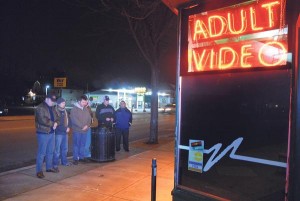 Now this isn’t news from the Wall Street Journal, but for us in this small town of Kenmore NY, it is a tremendous victory. I am talking about the Village Books and News adult shop located in one of the most densely populated family areas in Buffalo. It is a full fledged porn shop and has been in the town for over 30 years. Indecency laws have been passed to ban pornography shops in the town, but since this the shop was established before the laws were passed, they were grandfathered in, and has remained the eye-sore of the community. The other day as I was passing by I noticed that the neon sign that says “Adult Video” has been turned off for the first time in 30 years, and a sign that says the store is closed. A shop that was open 24 hours a day is now gone.
Now this isn’t news from the Wall Street Journal, but for us in this small town of Kenmore NY, it is a tremendous victory. I am talking about the Village Books and News adult shop located in one of the most densely populated family areas in Buffalo. It is a full fledged porn shop and has been in the town for over 30 years. Indecency laws have been passed to ban pornography shops in the town, but since this the shop was established before the laws were passed, they were grandfathered in, and has remained the eye-sore of the community. The other day as I was passing by I noticed that the neon sign that says “Adult Video” has been turned off for the first time in 30 years, and a sign that says the store is closed. A shop that was open 24 hours a day is now gone.
The last time people protested the establishment was in the days of its inception back in the late 70’s and since then it has been tucked in a plaza that most people don’t pay attention to, not because they feel it isn’t harmful, but because it has been there for so long, and its reign has finally come to an end.
It wasn’t until a couple years ago when a couple of us guys decided to pray out there on a weekly basis when a revival began, and it was met with a fight. We decided to engage in prayer and nothing else in front the place. Peaceful and prayerful. We were met with the police threatening arrest, to people screaming and shouting at us, to engaging conversation from people wondering what we were doing. This one time we were praying as we usually do, and a guy was walking toward us. When he passed us, there was no eye contact, no conversation, and he planted himself right next to us and started praying with us. When we finished, he kept on his way. It was simply an amazing act of the Holy Spirit. It is difficult though. There was a time when a couple of girls were passing by and asked us what we were doing. We told them and they were shocked, only because they felt there there is nothing wrong with it. After a long conversation. the one girl admitted that her father had a huge porn addiction and went on to explain how that affected her as a female and her relationships with other men. It was touching, but at the same time devastating.
I have a tendency to think we were doing good out there, but when it comes down to it, it was God’s will that lead the way. I cannot help to think that it was prayer that led to the shutdown of this joint, and it was difficult, to say the least to keep it going. In Buffalo, when its cold, well, its COLD. And during prayer we got in the habit of kneeling as we sung the Chaplet of Divine Mercy, which needless to say was not pleasant to listen to when you hear voices like ours. We know it had an effect though. There was a night when we started singing, and the clerk as he heard us, would increase the volume of a movie playing in the shop. As he raised the volume inside, we raised the volume outside. You just knew there was a spiritual battle taking place. We would start with the St. Michael prayer and then entrust the closing of this place to Mary, a living sign of purity, the real Woman, followed by a rosary and the Chaplet of Divine Mercy. It was our Mother that guided the closing of this place. It is Her that is leading this mission.
to the shutdown of this joint, and it was difficult, to say the least to keep it going. In Buffalo, when its cold, well, its COLD. And during prayer we got in the habit of kneeling as we sung the Chaplet of Divine Mercy, which needless to say was not pleasant to listen to when you hear voices like ours. We know it had an effect though. There was a night when we started singing, and the clerk as he heard us, would increase the volume of a movie playing in the shop. As he raised the volume inside, we raised the volume outside. You just knew there was a spiritual battle taking place. We would start with the St. Michael prayer and then entrust the closing of this place to Mary, a living sign of purity, the real Woman, followed by a rosary and the Chaplet of Divine Mercy. It was our Mother that guided the closing of this place. It is Her that is leading this mission.
I want to simply conclude that anyone reading this can make a difference in your area. All you need to do is say YES! Say yes to going to a place to pray in public even if it makes you feel incredibly uncomfortable. Christ knows that, and all He asks is for you to be His vessel and He will do the rest. Christ has allowed us to be disciples in His mission and He is calling you too! You just need to answer the call. Three guys joined together in prayer in front of multiple indecent shops and this is what God has brought from it:
1) We prayed out in the warmth and the cold for such a long time, and this book shop shuts down after over 30 years.
2) We prayed once outside of the hamburg strip club, the place shuts down a few weeks later
3) We prayed and acted on the pornographic building with a cover sign facing all traffic of a major turnpike, the sign was removed within 2 weeks after the owner said it would never come down.
4) Family Video has yet to get a tenant to their building, which is the cornerstone to them staying economically viable.
This was achieved with a small number of guys. You men reading this can do the same. What if there were 10 guys? What if there were 20 guys? What if there were 100 guys? What of there were teams scattered around the city protesting these places? We could change an entire community!
You are being called as men to organize and shut these places down, which includes porn shops, strip clubs, and abortion clinics. If you have not been out, get motivated to change this culture, and in return God will take care of the rest. We will be engaging in more battles to come so stay tuned to the site. Stay strong brothers and God Bless
Fire House Evangelization
July 20, 2011 by admin
Filed under Blog, cultural manliness, Faith, manliness, Military, pornography, Sports, Virtue
 Very recently, I became a member of the local volunteer fire company in our new hometown here in Pennsylvania. I attended my first training session last night and was fairly impressed with the skills, knowledge and welcoming nature of the men who were there and am happy to finally be living out a childhood dream to be a firefighter. (My Grandfather Anthony was a volunteer firefighter and ever since I learned that about him, I wanted to do it too.) But, my work is cut out for me at the fire house.
Very recently, I became a member of the local volunteer fire company in our new hometown here in Pennsylvania. I attended my first training session last night and was fairly impressed with the skills, knowledge and welcoming nature of the men who were there and am happy to finally be living out a childhood dream to be a firefighter. (My Grandfather Anthony was a volunteer firefighter and ever since I learned that about him, I wanted to do it too.) But, my work is cut out for me at the fire house.
You see, at the fire house, the apparent need to be macho is very prevalent. ‘Cultural Manliness’ in full swing. It’s been a while since I’ve been around this sort of behavior in this sort of context, but it certainly isn’t new to me. I played sports my entire childhood life, even up into college (FB and Rugby at BC) and it was very prevalent there, too. The idea that the more smack I talk, or the better zinger I can dish out, or the more raunchy the joke or the more foul the language, then the more manly I am. Obviously, if you’ve ever read this blog before, you know where I stand on this issue. These behaviors and characteristics don’t make you more manly, in fact, they diminish a man’s ability to live TrueManhood.
So, as I look forward to getting fire calls, attending training and potentially saving property and lives, I look forward also to the sort of impact I can make in the lives of my fellow brother firefighters. I plan to make in-roads with men individually and once a relationship is forged and I gain trust and moral authority with them, I will begin to challenge them to not act like the rest of the guys. We are a small fire company, but have great potential due to our leadership and equipment. This will be the true test of my ability to live the faith and set a good example. Most of the men who were present last night did not come off at first glance as being believers, but as with every man, their core is good. A little refinement (I continue to need LOTS of refinement) will do them some good and they in turn will do even more good than that!
I turn this around on you… where in your life are you surrounded by cultural manliness? Are there men around you that act like this? Maybe you’re a firefighter, athlete, military serviceman, salesman, waiter, CEO, construction worker, missionary, or some other profession… where can you make an impact and live as a TrueMan instead of a cultural man?
TrueMan up!
Welcome to Philly, Archbishop Chaput!
July 19, 2011 by admin
Filed under Blog, Faith, Fatherhood, manliness, Scriptural Examples, Virtue
Okay, so he’s not here yet (will be installed on Sept 8, 2011), but the faithful in Philadelphia are very excited to welcome him! Archbishop Chaput is an incredible shepherd and has always been wonderful to me on a personal level. I had the privilege of meeting him while in college; while still an anti-Catholic/sola scriptura/ evangelical. I then was able to meet him several more times, post reversion, working with FOCUS (The Fellowship Of Catholic University Students) and then on a more personal note when I was Director of Catholic Campus Ministry at the Air Force Academy; he was always wonderful about coming to the Academy to speak to the Catholic cadets. His leadership is second to none, but his humility is that of Christ. He is an incredible man and we are blessed to have him as our new archbishop.
Archbishop Chaput is an incredible shepherd and has always been wonderful to me on a personal level. I had the privilege of meeting him while in college; while still an anti-Catholic/sola scriptura/ evangelical. I then was able to meet him several more times, post reversion, working with FOCUS (The Fellowship Of Catholic University Students) and then on a more personal note when I was Director of Catholic Campus Ministry at the Air Force Academy; he was always wonderful about coming to the Academy to speak to the Catholic cadets. His leadership is second to none, but his humility is that of Christ. He is an incredible man and we are blessed to have him as our new archbishop.
(Our journeys are similar… from Kansas, to Colorado, to Pennsylvania. And, I hear he’s a Steelers fan!)
Here’s an interview with him from Catholic News Agency…
Q: You must have some interesting thoughts about being appointed to the See where the Declaration of Independence was written, the “City of Brotherly Love” where the first American male saint — St. John Neumann – was bishop.
A: I don’t think it’s real for me yet. I could give you half a dozen reasons why other men might be more qualified, and why I’m the implausible choice. But I do believe in the Holy Father’s wisdom, so I accept that the See of Philadelphia is where God wants me to be. My life as a priest – first as a Capuchin Franciscan and now as a bishop – is shaped by a commitment to obedience; obedience to God as Father. The voice of the Pope is the voice of the Father for me.
I’m going to miss the Archdiocese of Denver very, very much. Colorado has been home to me for 14 years. The priests and people there have been unfailingly generous. They really are my family, and a part of my heart will always be in Denver.
But I look forward to embracing the new family that God is giving to me, the family that is the Church of Philadelphia. Over the years I have had many friends, both priests and laypeople, with roots in Philadelphia, and I’ve always been struck by their faith and their goodness. So it’s a great privilege to be sent there. The fact that Philadelphia is where of the Declaration of Independence was signed and the center of so much of our country’s early history, means a great deal to me. I think the United States has been blessed by God in unique ways. Because of that blessing, America has a duty to be a blessing for the world and for all people. I also think that words like “the City of Brotherly Love” should be more than just a good tourist slogan. Philadelphia is one of this country’s truly great cities, and I want to be part of renewing and deepening the best in this community.
I’ve been praying to St. John Neumann a lot since getting the news. I want to love the priests and people of Philadelphia with the same zeal he brought to his ministry. At least I can guarantee that no one will work harder, or try harder, than I will.
Q: What are the main challenges you might face in your pastoral mission?
A: The biggest challenge, not just in Philadelphia but everywhere, is to preach the Gospel in a way that captures the imagination of God’s people. The biggest task that lies before us is evangelization. We need to have confidence in the Gospel. We have to live it faithfully, and to live it without compromise and with great joy.
The Church in Philadelphia is at an important point in her life. It’s not a time to be embarrassed about what we believe. In fact, it becomes even more crucial to preach the Gospel – both within the Church and outside the Church.
Q: Regarding the grand jury report and allegations involving the clergy, what needs to be done in restoring the mission and the morale of the priesthood? What are your ideas about the priesthood, and also the relationship with the laity?
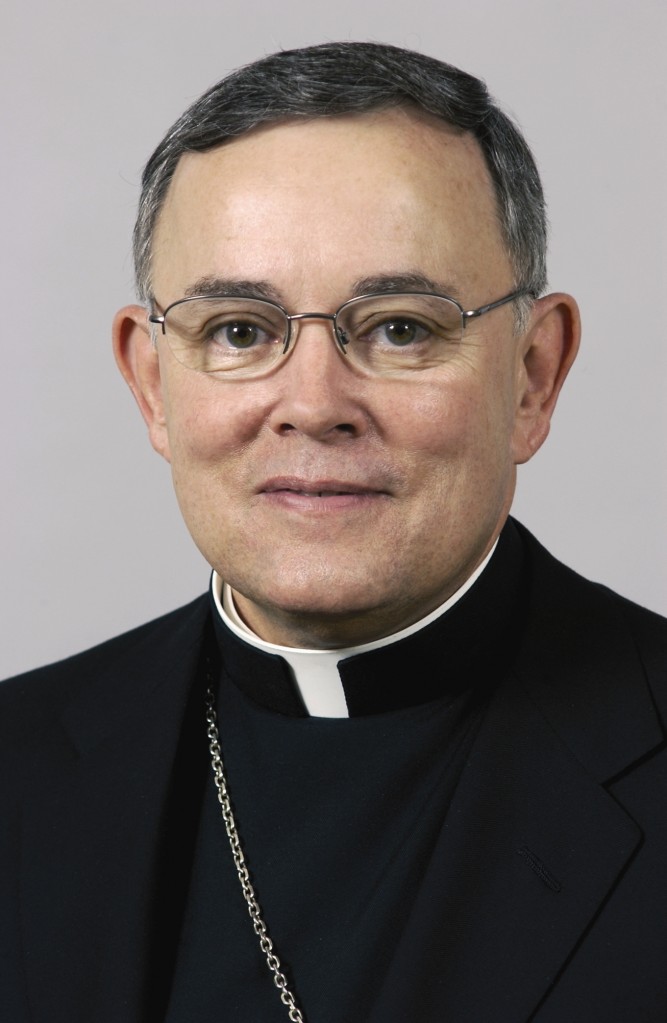 A: I haven’t read the grand jury report yet, and it will be awhile before I fully understand the issues. I need to hear from the people involved in these matters and to learn the facts before I comment.
A: I haven’t read the grand jury report yet, and it will be awhile before I fully understand the issues. I need to hear from the people involved in these matters and to learn the facts before I comment.
I do know that priests’ morale across the country has been seriously wounded by the abuse scandal. I’m sure the priests of Philadelphia carry this burden in their own unique way. But we know that Jesus, when he chooses men to be priests, chooses them with a brother’s love, and I want to be a sign of that love to my brothers. We have to deal with scandal in an honest, thorough, confident way. We can do that, even when it’s very painful, because we know that Christ rose from the dead. “Jesus Christ is risen” — these aren’t just powdered words; they’re a statement of fact. That should give us confidence that what happens in the Church, even when it seems death-dealing, can be turned into a moment of resurrection.
Q: What catches your attention most about the local Church in Philadelphia?
A: I have a lot to learn about Philadelphia, but I’m eager to get started. I did live in western Pennsylvania for 10 years – first as a seminarian, then as a seminary professor, and eventually as a part of the administration of the Capuchin Province of St. Augustine based in Pittsburgh. My time in the state was delightful. I look back on it with great joy. The men and women of Pennsylvania that I’ve met are wonderful people; good, generous and creative. I look forward to being a part of their lives.
Q: You’re a Native American and quite proud of your heritage. Can you talk a little bit about your background, and what that means to you?
A: I’m Native American on my mother’s side. I’m a member of the Prairie Band Potawatomi tribe. Our reservation is in northeastern Kansas.
Being Indian was probably the entry point for my becoming a bishop. One never knows why one becomes a bishop, but my first assignment was the Diocese of Rapid City, South Dakota. I suspect I was sent there was because of my engagement with the Native American Catholic community in the United States. The Holy Father was looking for a way to reach out in special love to the native people. So I see my episcopacy, in some ways, as born from that part of who I am.
The Native American people – the original inhabitants of this land – are a very diverse group with many, many gifts. I’ve always hoped that through my service as a bishop, those gifts can be recognized by the Church all the more, and that the Church can better meet the needs of Native people.
I was blessed to be the first Native American archbishop, and my people were honored by that.
Q: You’re also a Franciscan Capuchin. St. Francis had a pretty radical approach to the Gospel, and the Capuchins were known as reformers within the Franciscan community. How does this shape how you see the Church’s task, and your role as a leader?
A: Francis was radical in the root meaning of the word “radical,” which means to go “to the root” of the matter. He wanted the friars to live the Gospel clearly, without compromise. The word he used was, “without gloss.” It was a custom, in the Middle Ages, to develop commentaries on the Gospel, and sometimes those commentaries would explain away the Christian’s responsibility to live the Gospel without compromise in every moment of our life. Francis rejected any kind of effort to diminish the demands of the Gospel.
Of course, I have to live that discipline personally in my own life. That’s the most important part of my Capuchin identity. But then I have to preach the Gospel in the same kind of way, in a way that’s clear, that’s always fresh, and always without compromise.
Before anything else, we’re called to be Catholics. That should be the defining part of who we are. Whether we’re Indians or Germans or Irish; whether we’re Democrats or Republicans, we are Catholic first. Everything else is secondary. Francis called his brothers not only to live that Catholic identity personally, but to preach that unvarnished Gospel with clarity. And I hope that my service as a bishop always enables me to do that.
Q: You’ve talked about this issue of Catholic identity frequently. Why is that so important to you? Is there something about American culture that encourages people to compartmentalize their faith from the rest of their lives?
A: Many of the dominant themes of our time work contrary to the Gospel. All of us who are Catholics are very much influenced by our culture and by our society’s criticism of the Gospel. Because of these pressures, Catholics are often tempted to be embarrassed by their faith, and to make decisions that are compromised by our desire to somehow please the world, while satisfying God. We often can’t do both. We always need to choose to please God first.
We need the support of the Church, the help of our brothers and sisters in faith, to live the Gospel in this difficult environment. That’s why I’ve spent so much time in these last years, as a bishop, writing and speaking about this. I want the Church to have confidence in the Gospel and Christians to support one another, regardless of the opposition to the Gospel in our culture.
We owe it to our country and the age we live in, to be faithful Catholics. If we’re good Catholics first, then we’re good citizens, and if we’re good citizens, then we’ll be a force of transformation for justice in the world. If we don’t live as faithful Catholics, we betray the Gospel. We forfeit the opportunity God gives us to make a significant difference for the evangelization of culture.
Q: Many Catholics now serve in Congress, in state houses, in governors’ mansions — we even find Catholics as a majority on the Supreme Court. But we often don’t see the content of Christian social teaching reflected in society. Does this relate to that issue of Catholic identity?
A: There’s an obvious temptation, in political life, to compromise Christian virtues and values because of the pressures of the society around us. But I wouldn’t first point to governors, or congressional representatives, or Supreme Court justices. I’d point to ourselves. If our political leaders lack conviction about their faith, it’s because the members of the Church lack conviction about their faith. Political leaders are no different from the rest of us. So if we point fingers at them, we’re also pointing fingers at ourselves, and at the broader Church community.
So the Gospel should be preached, first of all, in the Church. Naturally, we need to preach it to political leaders as well. But they’re not alone – not by a long shot — in their tepidity and compromises of the Gospel. If Catholics in their homes and parishes understand that, they’ll realize that a serious conversion needs to take place in all our lives, and not just in the lives of politicians.
Q: If this applies to every member of the Church, how do you think it applies to bishops? What do you think is the role of a bishop in American society?
A: A bishop, before he’s a bishop, is a Christian. And before he’s ordained, he’s baptized. So I think that anything that we say about Christians, we have to say about bishops, too. And bishops, because they’re raised up to be a sign of the presence of Christ in the Church, need to live the Gospel more clearly and more authentically, without compromise, than anyone else.
We can’t preach to others what we don’t embrace ourselves. And because we sometimes don’t practice these things ourselves, sometimes we’re embarrassed to preach these things to others. This is also why those who are called to preach the Gospel might sometimes be silent.
So I think that bishops always have to be engaged in the process of their own personal conversion – prior to calling others to conversion. At the same time, we can’t let our sins and our failures cripple us; otherwise the Apostles themselves would have stayed silent. We have to practice what we preach. But even if we don’t, we always have to preach the Gospel. And if we preach it to others, conscious that we need to be converted ourselves, then things really will begin to change.
Q: From your perspective as a bishop, where are we as a Church, and as a nation, on the issue of abortion?
A: I think that our country, in some special sense, is going to be judged by God on that issue. If we’re not able to protect the most vulnerable members of our society, then we aren’t living up to the public commitment we have as a nation to protect the life, liberty, and happiness of every individual. The unborn child certainly shares with us our human dignity, and has a right to those protections. That’s why I believe this remains one of the fundamental issues of our time. We can’t be a people of justice if we don’t protect the life of the unborn child.
This is, of course, just one of the pressing issues of our time. Also vitally important is the question of the meaning of marriage. Family life is the foundation stone of all community. It’s the first community that we’re born into. The health of our families will lead to the stability or weakening of our society.
The Church’s efforts today, to protect the traditional meaning of marriage, are on behalf of stable family life, for the sake of children. Marriage is a relationship of a man and a woman, in a stable and faithful way, for the sake of children. The most important thing for our development into mature adults is that we know that our fathers love our mothers and our mothers love our fathers. If we don’t know that, then a certain kind of instability enters our lives. Anything we do, as a country, to undermine that meaning of marriage, creates a danger – a clear danger – to the long-term health of our country.
Q: The fact that civil laws favoring so-called gay “marriage” have been approved in several places, in the last two years, has led some people to say that the Church, and especially the bishops, have “lost the argument” in the American culture. How do you think individual Catholics should approach this issue in their communities? And what is the right role of the institutional church and the bishops?
A: We only lose when we stop working and struggling for what we believe to be true. In a very general sense, the battle was “lost” the day after Golgotha. Except the disciples didn’t get the memo.
I don’t think we’ve lost the marriage issue at all. Even framing the question that way shapes the answer in a wrong direction, because the language of a debate conditions how we think. If we concede the language, we concede the issue. I do think we’ve been allowing ourselves to lose the marriage debate for years, rooted in our confusion about individual and community rights, and our fear of being portrayed as “against” other people. Catholic teaching on sexuality and marriage is for human dignity; it is for human happiness and the virtuous development of family and society. It is “against” only those behaviors that undermine those goals. When people try to frame Catholic belief as an intrinsic hostility for individual persons or groups, they are not being honest.
Cohabitation today without marriage is quite common, with children being born outside the context of married love, and many people are confused about what marriage really means. Generally, people think “marriage” means a loving relationship between two people that has a sexual component. But that’s not what marriage means. It means a specific kind of loving relationship, for the sake of children. And the more we’re confused about that, the more damage we do to ourselves. So we need to have confidence in our faith and keep fighting this fight with a spirit of serenity. The Gospel is true, and the Church is right about the purpose of human sexuality, whether our critics like the message or not. So much is at stake –not just the moral teaching of the Church, but the health of our communities and our country. If we love our country, that means we fight for the things that protect our country and make it strong.
Q: Four years ago you wrote a book on Catholic political and social engagement, “Render Unto Caesar.” If you had to write that book today, would it have a different accent? In other words, what issues look most important to you today for Catholic political involvement in the United States, and in general, Catholic involvement in the public square?
A: When I wrote that book, four years ago, I was responding to a request from a friend – a young husband and father — who had run for state office, but found it troubling because of the pressure in party politics to embrace issues contrary to Catholic belief. I wanted to engage Catholics in a reflection on their responsibility for our country, and how politics can never be separated from faith even though “separation of Church and state,” properly understood, is a principle that’s worked well in our country. My point is that separation of Church and state was never intended to mean that we separate our faith from our social, economic and political life.
I have a high regard for the book’s publisher, and we’ve talked about doing an updated edition of “Render Unto Caesar.” Since my appointment to Philadelphia, I’ve had a certain kind of enthusiasm for a new version. So, give me some time, and you never know. Maybe I’ll have some additional thoughts on faith and public in the 21st century.




